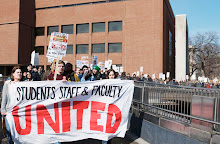“'Obviously, the University isn’t rolling in dough, but it wasn’t made clear that pay cuts were really necessary and that all other options were explored,' said Gil Rodman, professor and member of Faculty for the Renewal of Public Education. 'The crucial parts of the budget decisions have been completely opaque.' Some faculty expressed frustration with Bruininks’ refusal to support the sliding scale and his emphasis on the fact that a decision needed to be made soon. 'I feel like we’re being held hostage, because we’ve known about many of these issues for years,' anthropology professor Karen-Sue Taussig said. 'I feel like we’re being held hostage by hearing that this is the only acceptable proposal to the administration.'" http://www.mndaily.com/2010/03/28/faculty-senate-approves-pay-cuts
"These reductions will save $18 million in a bid to close the University’s swelling $132 million budget gap. If historical trends are any indicator, the difference will be recovered with tuition. Dig in for talk of double-digit increases. This across-the-board proposal was not the only option on the table last Thursday. An alternative proposal, deemed the 'sliding scale,' would have yielded equivalent savings with a more progressive cut schedule. During the height of the Great Depression, the University cut pay according to salary level, where wages at the bottom were held steady while larger percentages were cut up top. This time around, across-the-board cuts will inflict greater harm on the lowest-paid staff than on tenured professors or the ever-growing cadre of vice presidents...For clerical workers, janitors and other low-paid University employees, the vote came as a stinging rebuke of progressive principles. AFSCME 3800 President Phyllis Walker said after the meeting, 'This means that some clerical workers won’t be able to buy presents for their children this holiday season.' So why the lopsided vote? It’s complicated. Political science professor Teri Caraway, a member of the Chop from the Top Coalition and a supporter of the sliding scale, explained that administration had coerced faculty into approving the administrative plan. “He held a knife to our throats,” she said. In an e-mail sent to faculty mid-March, Bruininks spoke in not-so-veiled terms: 'If there is not a vote in support of a reduction in pay for faculty, our budget plan going forward will necessarily include deeper college- and unit-level cuts, which will inevitably lead to additional job losses.' Under direct administrative threat of layoffs and with word from St. Paul that failing to vote for pay cuts would further erode what little remains of legislative support, it’s understandable that so few faculty members were willing to 'rock the boat.' While we applaud the faculty for (mild) self-sacrifice, they failed to use their consultative power to craft a more just and sustainable solution that would have spared vulnerable employees from financial pain and scrutinized the very real potential of the University to price itself out of the market. With little say in the budget process, students should be disappointed that faculty legislators were not more willing to craft and consider alternative budget proposals, which would’ve been a clear sign of challenge to ever-more-expensive administrative lock-step. Microbiology professor Pat Cleary, who voted with the majority, partially blamed the vote on procedural limits: 'We should’ve been able to amend the main proposal, but parliamentary procedure wouldn’t allow it'...Many left the meeting looking to the future. Walker was energized regarding the students, staff and faculty who fought for the lowest-paid. “This is the beginning of a coalition that is going to go far,” she said.” http://www.mndaily.com/2010/03/28/faculty-votes-%E2%80%98no%E2%80%99-fairness
Sunday, March 28, 2010
Subscribe to:
Post Comments (Atom)


No comments:
Post a Comment